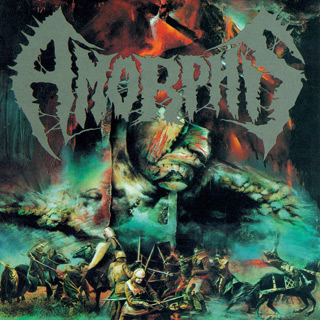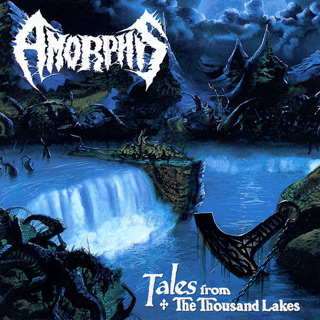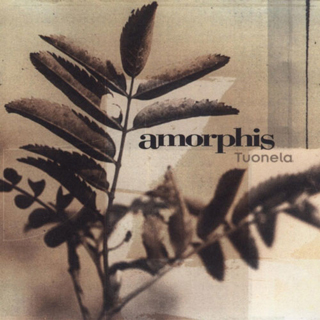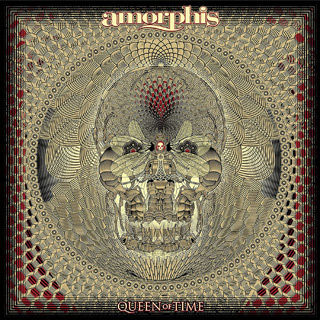When a founding member of a beloved band moves on to other things, it isn’t often that person returns to the fold and rides a wave of success and stability as that currently being enjoyed by Amorphis. Sometimes that member is the vocalist, and his or her return is far more up-front and obvious. With Olli-Pekka Laine, who resumed his duties as bass player in 2018, this particular homecoming was much more like the reunification of a family. To take nothing away from Niclas Etalavuori, the man behind the four-string from 1999 to 2018.
His presence was integral and his acumen unquestioned. But this is Olli-Pekka, the lanky blonde who’s affable likeness adorned those albums. Tales From The Thousand Lakes (1994), Elegy (1996), Tuonela (1999)– and yes even back in the days of “Vulgar Necrolatry” and the unique grind of debut album The Karelian Isthmus (1992). Bringing not just the chemistry from the formative days, Olli-Pekka brings with him a vast body of experience playing in such luminary bands as Barren Earth and Mannhai. For the latest album in the 31 years-and-counting history of Amorphis, Halo, he arrives in the midst of a profound uptick in both the reach and power of the band he helped create, as 2018’s Queen of Time stunned fans the world over. Recently the talented, brilliant musician sat down to chat about Halo and much more. . .
Cryptic Rock – Halo is the second album that you have been a part of since returning to the band you helped create. I know you said it felt like coming home the last time we spoke, but how does writing and perfecting Halo compare to writing and perfecting Tales From the Thousand Lakes and Elegy? Back then, you were still finding yourselves and still making the albums that would help to define you in that young time. But coming back and doing it now, all these years later, what is different about that creative process now and what is still the same?
Olli-Pekka Laine – All right. Well, apart from rehearsing the songs together, there’s not much. It’s all different apart from that. Because during the Tales and Elegy, we spent hours and hours in the rehearsing place. Arranged the songs together and analyzed them and got back to them after one week or so. We had all done our preparations in our heads. It was like, we were experimenting a lot in the 90s. I think every band does it in the first albums. We were trying new things and trying to find our own direction. Which we found, I think by Elegy and Tuonela. From there we haven’t had too dramatic of changes in the music. Maybe Far From the Sun (2003), I don’t know. But still after the Eclipse (2006) album it’s been kind of stable when it comes to Amorphis music.
So, I’d say that with Tales from the Thousand Lakes, the songwriting process took two years with the band. With Halo, it’s been two months. Of course, all band members are continuously composing stuff and so on. But we just rehearse them before the recording session, and we do our thing in the studio. Unlike with the ’90s albums when we rehearsed like tons. We had tons of rehearsal. We practically lived in the rehearsing room because we didn’t have any other life. Back then. Nowadays we have families, and we are touring quite a lot as well.
Cryptic Rock – That has to be one of the most difficult things, having to compress your creativity into a schedule, and that kills a lot of bands. Usually, that is the difference between a band thriving and a band dying out.
Olli-Pekka Laine – Yeah. It’s also that we have learned how to compose songs. We didn’t know it back in the ’90s but nowadays we can sit down and write something. But we have to cooperate much more.


Cryptic Rock – That cooperation has led to some amazing results, for sure. Can you tell me some of the thematic concepts going on inside Halo? The cover art is very striking, and it is immediately noticeable that you have both dark and light. Was that on purpose? Does that have anything to do with the themes of the album?
Olli-Pekka Laine – Yeah, I think it was the lyricist, Pekka Kainulainen, who requested that we should have a life and death and a new beginning theme in the album cover. It just got quite different when we sent our first drafts. We requested him to make some changes and pretty soon he came up with this. It’s pretty cool because I think it has lots of new elements and also something from the Elegy era. It fits the album title, Halo as well because it’s round circle thing. Which is reflected from the sun and a circle of life itself, so that’s the theme with the cover.
But I don’t know, does it have much to do with the lyrics? Of course, there’s a song called “Halo“ on the album, but there is a loose theme on the lyrics throughout the album, which is like when the people started to gather to Finland after the Ice Age. And, I don’t know, that kind of reflects to modern times, because people are living in the bubbles around the world, so that’s how it was back then. That’s how it is today.
Cryptic Rock – That’s very true. Whether it’s because we’ve been conditioned with social media toward not going near each other with the pandemic, it has created an inward-looking, maybe not the healthiest inward-looking motif in people’s lives. Switching gears, the moniker of Amorphis takes its name from the word ‘amorphous,’ meaning shapeless, of indefinable edges. I think that is one of the things that keeps the band so vibrant. You are not afraid to paint yourself in these slightly different shades in different album cycles. We hear Tomi Joutsen’s death growls a little bit more to the forefront in this album, but the whole bottom end of the band is heavier on this recording. Your bass guitar can be heard quite well, which is reminiscent of Tales, and Jan Rechberger’s drums are just huge. Is that a Jens Bogren producer’s decision? Is this a band decision? Do you decide, okay, let’s get a little heavier this time around? Let’s go back to our roots a little bit.
Olli-Pekka Laine – Well, it’s hard to say, I think there’s some points in both of those, I guess. We actually recorded the album without Jens this time. Just as a band. We started it in Helsinki. We played together as a six-piece in the studio, and we played all the songs together there in a live situation and recorded that. And there, we started to build the album. So that might be one reason the playing is a little bit looser on this one. First of all, Jens wasn’t there to give us pressure. So, we could give it a go a little bit more, at least I could. Because it was a little bit relieving not to have a producer for my parts. I don’t know about the other guys, but for me it was better. It worked better like this.
I had an engineer and producer for the bass guitar, but he was pushing me to play more and do what I liked. And that’s what I did, at least tried to do. And I had my own gear in the studio, which was a great thing, but still the session was, we played our instruments separately. Snoopy (Jan Rechberger) played his drums on top of that. And then we went there one by one. And for starters, Tomi Joutsen and I were in the same studio in the different rooms doing our separate things. It was a different kind of session. Those files were sent to Jens by We Transfer. He edited them at the end of the day. It was an interesting way of making an album, like a virtual way to work, which was like science fiction back even just 10 years ago, at least nowadays is possible.
I kind of still prefer the old school way, old school fashion playing in the studio with the band. And I prefer using live tracks. But in this method, it’s nearly impossible. But it was also a little bit longer process compared to Queen of Time (2018). Queen of Time was maybe two months and that’s it. And with Halo, it took around six months to complete the recordings.

Cryptic Rock – It speaks to the chemistry within the band, because Amorphis has been on such an upswing, it is quite amazing. Listening to the new album, the songs feel like old friends already. Created in such a time of uncertainty, it begs the question. When last we spoke in 2018, when you first came back you had expressed some trepidation about leaving behind a career related to the three collegiate degrees you’ve earned. It was only two short years after you committed to Amorphis that the pandemic struck. How does it feel to endure that uncertainty, and to come out on the other side of it? Do you feel like things are coming back and do you feel optimistic about the future of the music industry in itself? Will art and music win?
Olli-Pekka Laine – Well, I think eventually it will win. Cause people will always want to go to the concerts, to the live situation, no matter what. At least I do. That’s a good question about uncertainty because there are pros and cons about this COVID period, because we’ve learned to live with uncertainty, which is not necessarily only a bad thing, because you cannot plan your life. You can make plans, but you cannot expect them to happen. When COVID struck I was fortunate enough to get to my day work back. So, I’ve been there ever since, and it seems like I will have to make decisions again. But still, it’s kind of a certain thing with what will happen. Because I’m a musician and a composer and performer.
So I know that this is my thing and whatever happens, I will stick to that. But still, through it all there’s been little bits of optimistic views on how it will be this year. I’m still kind of keen to stay a little bit cynical of how it goes. But anyway, we will do our best and we will keep booking tours and we will try to do every show that we will book. So, let’s see how it goes. I hope at least I feel like we were able to do some gigs this year. I mean last year, which was kind of a good in financial way. And let’s see. Let’s see how it goes. Thumbs up.
Cryptic Rock – Let us hope indeed. On Halo, Amorphis seems to be referencing a bit more of their whole musical catalog. For example, the song “Windmane” is quite reminiscent of Tuonela and AM Universum. And yet the band always seems to move forward. What do you think makes Amorphis so stagnation-proof? The band has always seemed to know exactly when to make a stylistic shift to keep things fresh. After 31 years, how does Amorphis keep from resting on its laurels so well?
Olli-Pekka Laine – Well, I think it is because we are sort of open minded when it comes to the music and we started as a death metal band, and we didn’t have much to lose commercial-wise back then. So we could experiment a lot, like many bands did back in the days. Say for example, bands like Carcass who began the way they did, started to make death and roll at some point. So, because we were working in a marginal position and in the grassroots level, you don’t have to think about commercial successes so you can do whatever you like. And people tend to like that. At least I do. When bands are doing things from their heart and not giving a fuck what the record labels or media say, it’s kind of what made this all possible. Because we are able to stay open-minded when it comes to music, and we don’t need to fear any change. And that’s what we do for entertaining ourselves as well.
In the first place, we do make changes in our music, and therefore we do produce different kinds of albums. I think this trilogy is a pretty solid piece of Amorphis’ career. Those albums don’t differ that much from each other. If you compare those to Circle (2013), and a couple before that with Tomi Joutsen, for example. But who knows what’s happening next? I don’t know. It’s kind of hard to say at this point. But I hope that we will keep on experimenting with our music and experimenting with producers as well.
Cryptic Rock – When the results are so convincing, this experimentation is a great thing. Would you agree that it’s easier nowadays to keep outside forces from defining who you are as a band? When Amorphis began at the advent of the 1990s, despite all the freedom you had, do you feel that there were much more clearly drawn lines between the genres? With the saturation today of the internet and the ability of people to reach you instantly on social media, does that wrest power away from the record labels now?
Olli-Pekka Laine – Well, I personally think it’s a bit opposite. At least when it comes to music like Amorphis because during the ’90s, I think bands made more experimentation with the music. But still when you start to get success, of course, there are lots of people who are trying to affect you and give you advice what to do and telling you what you can do music-wise and what you can’t do music-wise. I’ve seen that and it still happens. We can do whatever we like, because we are in that position. But I don’t know about younger bands.
There are lots of good music these days as well. I think like there’s surprisingly great bands coming. It’s not a bad situation when it comes to demo bands, for example, new bands. So yeah, I think it was, ’90s was a little bit more open-minded era for music, I think for metal music. But still, it was like a bad decade as well when it came to its end. So, it was burnt out quite quickly. But still, that’s where we find our personal direction. By experimentation, so that’s a necessary thing to do at some point.
Cryptic Rock – That is a valid point. Contemporaries of Amorphis such as My Dying Bride, Katatonia, Rotting Christ, and Kreator, they all went through that experimental phase and then came back to their roots. Mille {Petrozza (Kreator)} says they couldn’t have made 2001’s Violent Revolution without making 1999’s Endorama, for example.
Olli-Pekka Laine – Yes, definitely.
Cryptic Rock – Artists are not static creatures. It seems a lot of fans want to be so much a part of the band that they like can always define the band and they don’t want much change, but Amorphis is one of many bright bands who have always defied that.
Olli-Pekka Laine – Yeah, definitely. But still we have found our own form of music, so we don’t have to change that dramatically anymore. Like what we used to do.


Cryptic Rock – That is a good place in which to find yourselves. To carve out one’s own voice and sound, but to keep getting better, reaching new heights with each album. It is rare.
Olli-Pekka Laine – Thank you. Well, Halo is a little bit more stripped down than Queen of Time, which had lots of orchestration for example, and lots of keys and guest vocals and so on. But this time it’s a little bit harsher and it’s not that easy of an album as Queen of Time, but still it might be a little bit more rewarding. At the end of the day. You have to pay attention to it.
Cryptic Rock – It’s great to see Tomi Joutsen is challenging himself vocally, because with Halo, the death growls are really death growls, and his melodic singing is really melodic. It’s very progressive that way. The heavy verses and the clean choruses, like a wave crashing on a beach, seems to be a popular theme within the band, but one that always works so seamlessly.
Olli-Pekka Laine – That’s what we’ve done for every album, I think. It is amazing to see how Tomi is evolving otherwise. It is also going to be different to deliver this album live because there is so much variety between the songs and in the songs. A lot of growling, as you said. But it is going to be interesting as well to try out those songs live for the first time in America.





No comment